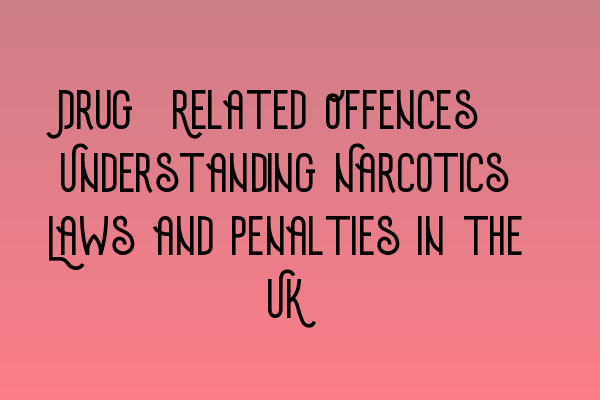Drug-Related Offences: Understanding Narcotics Laws and Penalties in the UK
Welcome to SQE Criminal Law & Practice Law UK blog! In this post, we will dive deep into the topic of drug-related offences, helping you gain a comprehensive understanding of narcotics laws and the penalties associated with them in the UK.
Introduction to Drug-Related Offences
Drug-related offences are serious crimes that involve the possession, production, distribution, or trafficking of illegal narcotics. The UK has strict drug laws in place to combat the misuse and abuse of drugs, ensuring public safety and well-being.
If you are charged with a drug-related offence, it is crucial to seek legal representation from a qualified solicitor who specializes in criminal law. They will guide you through the legal process, defend your rights, and help you navigate the complexities of the law.
Types of Drug-Related Offences
There are various types of drug-related offences, each with its own set of laws, penalties, and legal considerations. Some common drug offences in the UK include:
- Drug possession
- Drug cultivation or production
- Drug trafficking or supply
- Drug importation or exportation
- Drug conspiracy
- Drug driving
Each offence carries different levels of severity, depending on factors such as the type and quantity of drugs involved, the defendant’s intent, and their previous criminal record.
Penalties for Drug-Related Offences
The penalties for drug-related offences in the UK are categorized into different classes, with Class A being the most serious and Class C being the least severe. The penalties can range from fines and community orders to imprisonment, depending on the specific offence and the circumstances surrounding it.
For instance, possession of a Class A drug like heroin or cocaine can result in up to 7 years’ imprisonment and an unlimited fine. On the other hand, possession of a Class C drug like anabolic steroids may lead to 2 years’ imprisonment and a fine.
It is important to note that drug trafficking offences carry significantly harsher penalties, with potential sentences ranging from years to life imprisonment, along with substantial fines.
Legal Defenses for Drug-Related Offences
If you are charged with a drug-related offence, there are legal defenses that can be explored, depending on the circumstances of your case. Some common defenses include:
- Lack of knowledge or intent
- Mistaken identity
- Illegal search or seizure
- Police misconduct
- Entrapment
Your solicitor will thoroughly assess your case, gather evidence, and develop a strong defense strategy tailored to your specific situation.
Conclusion
Drug-related offences in the UK are serious crimes that carry significant penalties. Understanding the narcotics laws and the potential consequences is crucial if you find yourself faced with such charges. It is always advisable to consult with a reputable criminal law solicitor who can provide expert guidance and support throughout the legal process.
If you’re interested in SQE exam prep or other related legal topics, check out our articles:
- SQE Exam Prep: Essential Study Materials for Aspiring Solicitors
- Demystifying the Solicitors Qualifying Examination Format
- SQE Exam for International Lawyers: Challenges and Success Strategies
- LLC Formation Made Simple: Step-by-Step Guide for UK Entrepreneurs
- LLC Formation: A Step-by-Step Guide for UK Entrepreneurs
Thank you for reading. If you have any questions or would like to discuss your specific legal situation, please feel free to contact us at SQE Criminal Law & Practice Law UK.
